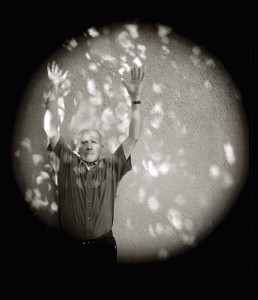S3: Fine Line - Episode 5 - Peter

Episode Information
Fine Line: Mental Health/Mental Illness – Episode 5 – Peter
[Intro Music]
Narrator: Welcome to Season three Fine Line narrative histories about mental health and mental illness, a traveling exhibition and weekly podcast edited and hosted by Michael Nye, supported by Kronkosky Charitable Foundation. May you find insight and understanding in these voices. Episode five, Peter.
Peter: I’m gonna tell you a little quick little story. Schizophrenia can, uh, can play on you so many different ways. One time I was, um, so schizophrenia. I thought the mafia was after me. I, I had voices telling me like the mafia wants, wants to kill me because I knew too much. I had money. I had a couple hundred dollars in my pocket. I don’t know how I got to the airport. I think I walked, got on a plane and went to California. I went into LAX and all the transmissions from the public address systems in the airport I thought were meant for me. Go to this gate, go to that gate, this gate, that gate out in round. I was going completely nuts. And I was scared. I was scared because the mafia was still after me. And all the time, voices are telling me to do this. Totally full blown paranoia.
I started school at four. I was able to read and write before I was in the kindergarten. By the time I was seven, I was in the third grade. And that’s when all the problems started. I was hearing voices and talking to the voices and being disciplined for talking in class. And the principal of the school felt that the only way that I would be quiet in class is with corporal punishment. So everyday, and I mean like fourth, fifth, sixth, and seventh grade, I would be in the basement of the schoolhouse with a rubber hose, and the principal on the other end beating my butt. And while this was going on, I’m hallucinating. When I complained to my parents, they just tell me, don’t be stupid. Don’t, don’t talk like that. Don’t, don’t say that. You know, they didn’t understand that I was really going through a difficult period.
Being addicted to drugs is, uh, like in, in my case, I wanted, I wanted the euphoria. I didn’t care how long it was. I didn’t care if it was only 10 minutes, or I didn’t care if it was only an hour. I wanted the euphoria. And in most cases, the drugs that I were taking was, um, pot, psilocybin. I took LSD when it was legal ,cocaine, took a lot of uppers and, um, took heroin, always shooting heroin. When I was homeless, I drank a lot of beer. Oh, two or 3, 4 6 packs a day. I, um, I would sleep in a flop house. I’d sleep on the grass, sleep in open cars. I was homeless about, um, five years.
The beginning of my coming out of the drugs and alcohol and mental illness was started at the, uh, mental health center. They sent me for testing, and they found that I had an extremely high iq. So they helped me enroll in classes at the community college, and they helped me get my associate’s degree. And this was the beginning of an identity that I’d never had before. And I was, uh, beginning to see, uh, how I could, uh, have a better life. I basically see schizophrenia as, um, it’s a bad mind. It’s, it’s a, it’s a chemical thing. It is very difficult to treat. I have new medication, which has changed my life around again. Zyprexa has helped me with, uh, the symptoms of schizophrenia. The meaning of life for every individual is self-actualization. You got to know yourself and be realized that you’re just a child of the universe. The meaning of life is a question that you should ask yourself almost everyday. You gotta do that. I think it’s important that, uh, everybody, including myself, be of service to humanity in some way. And in my case, it’s gonna be teaching. I felt that in the last few years of my life, I wanted to give rather than to take the people that I’ll be teaching and I’ll be teaching at the college level someday. All they will know is my academic background. They will never know my story. They will never know my story.
[Outro Music]
Host: The philosopher Emmanuel Kant asked four fundamental questions when he began writing the critique of pure Reason in 1781. What can we do? Where does our knowledge come from? What does it mean to be human? What can we expect from the future? These are questions relating to the humanities, the study of philosophy, world religions, history, languages, and the arts. Peter asked questions every day of his life. He said, who am I? What might I become? How might the world be changed for the better? Peter’s challenges were enormous. Schizophrenia, psychosis, addiction, homelessness with a determination, with help from others. Somehow, some way he was able to reach the surface for air. Peter’s transformation, his strength of will, was remarkable. Thank you, Peter, for taking us inside. Thank you for your eloquence and your presence. May something in his story stay with you. I’m Michael Nye. You can go to my website, michaelnye.org/podcast for Peter’s portrait and his transcript. Thank you for listening.
